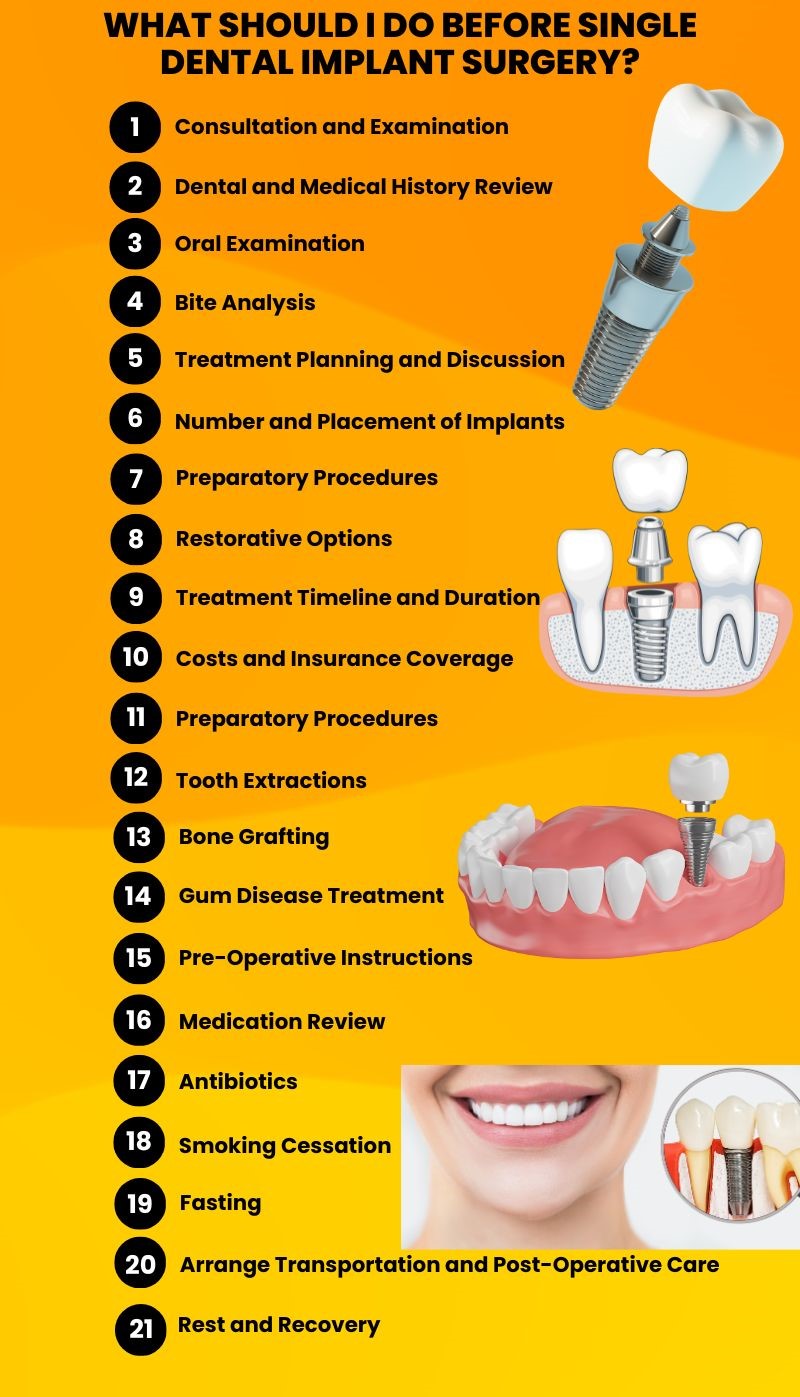How do you prepare for a tooth implant? in Turkey, Antalya
For dental implant surgery to be successful, a patient must be well prepared beforehand. Here's a comprehensive information on what to do in advance of dental implant surgery:

- Consultation and Examination: Schedule an initial consultation with a qualified implant dentist to discuss your dental implant treatment. During this visit, the dentist will perform a comprehensive examination, which may include:
- Dental and Medical History Review: Provide detailed information about your dental and medical history, including any chronic conditions, allergies, medications, or surgeries.
- Oral Examination: The dentist will examine your remaining teeth, gums, and jawbone to assess oral health and determine the suitability for dental implants. X-rays or 3D imaging may be taken to evaluate bone structure and plan implant placement.
- Bite Analysis: A bite analysis helps determine the proper alignment and occlusion of the teeth, ensuring optimal implant placement and function.
- Treatment Planning and Discussion: Based on the examination results, the implant dentist will create a personalized treatment plan tailored to your specific needs. During this stage, important aspects to discuss include:
- Number and Placement of Implants: The dentist will determine the number of implants required and their optimal placement to restore missing teeth and provide a balanced bite.
- Preparatory Procedures: If necessary, discuss any preparatory procedures such as tooth extractions, bone grafting, onitö disease treatment. These procedures aim to create a suitable environment for successful implant placement.
- Restorative Options: Explore the different restorative options, such as implant-supported crowns, bridges, or dentures. Consider the advantages, limitations, and costs of each option.
- Treatment Timeline and Duration: Understand the estimated timeline onitör treatment, including the duration of each phase. This will help you plan your onitör and manage expectations.
- Costs and Insurance Coverage: Obtain a clear breakdown of the treatment costs and discuss any insurance coverage or financing options available.
- Preparatory Procedures: Depending on your specific case, you may require preparatory procedures before implant placement. These procedures aim to ensure optimal conditions for successful implant surgery. They may include:
- Tooth Extractions: If there are any damaged or decayed teeth in the implant area, they may need to be extracted before implant placement.
- Bone Grafting: If your jawbone lacks sufficient density or onitö to support implants, bone grafting may be necessary. This procedure involves adding bone graft material to the jawbone to enhance its strength and density.
- Gum Disease Treatment: If you have gum disease, it should be treated before implant surgery to ensure a healthy oral environment onitör implants.
- Pre-Operative Instructions: Before the day of the implant surgery, your dentist will provide specific pre-operative instructions to follow. These instructions may include:
- Medication Review: Discuss with your dentist any medications you are currently taking, including prescription drugs, over-the-counter medications, and supplements.
- Antibiotics: In some cases, antibiotics may be prescribed before the surgery to minimize the risk of infection.
- Stop Smoking: If you smoke, your dentist will strongly recommend quitting or reducing smoking before and after implant surgery. Smoking can negatively impact the healing process and increase the risk of complications.
- Avoid Eating or Drinking: You may be instructed to avoid eating or drinking for a certain period before the surgery, typically 6-8 hours, to ensure an empty stomach.
- Arrange Transportation and Post-Operative Care: Since dental implant surgery is performed under local anesthesia or sedation, it is important to arrange transportation to and from the dental clinic. Additionally, plan for post-operative care, which may include:
- Rest and Recovery: Allow yourself time to rest after the surgery. Avoid strenuous activities and follow your dentist’s instructions for a smooth recovery.
If you have any questions you do not find here, please contact us.
